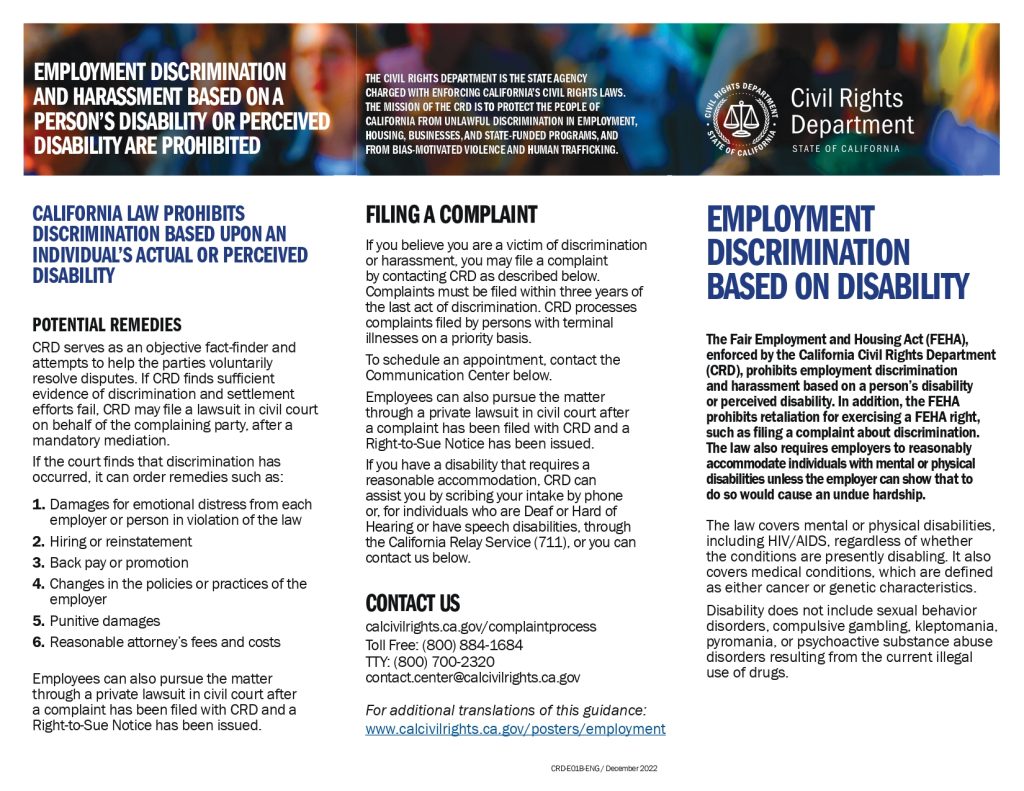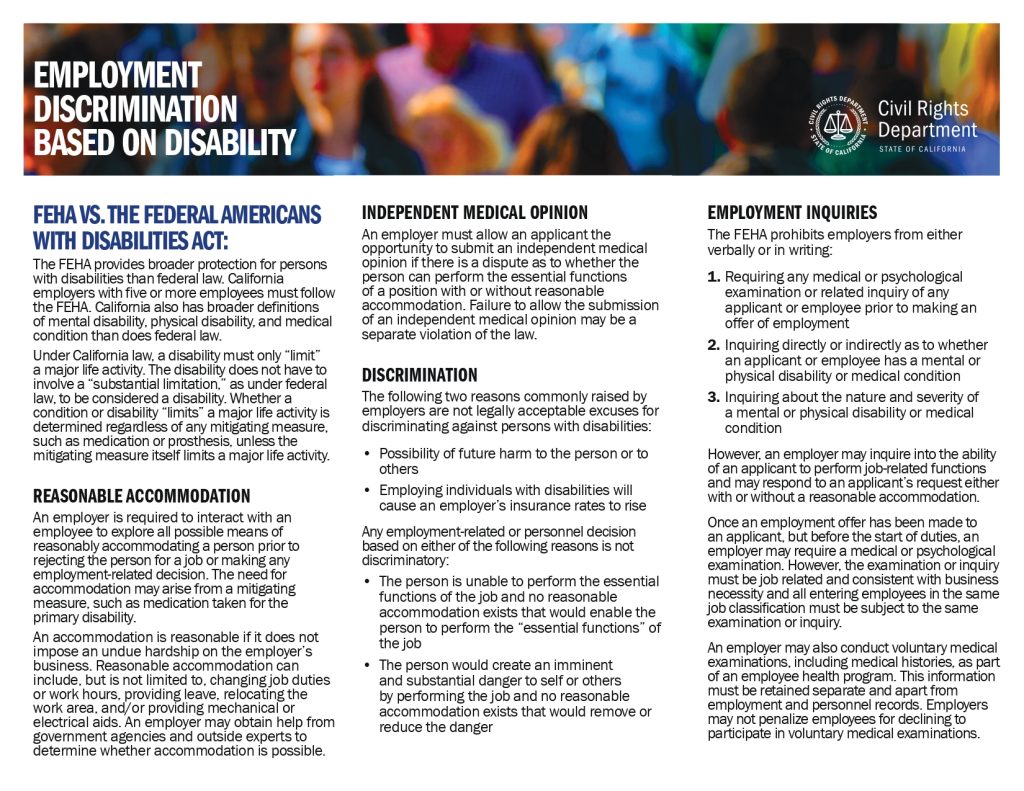
Can My Employer Fire Me While On Disability? Understanding Your Rights
Facing a disability is challenging enough without having to worry about job security. If you find yourself in a situation where you’re on disability leave and concerned about the possibility of losing your job, it’s essential to understand your rights and protections. In this comprehensive guide, we’ll delve into the legal aspects of being on disability leave and how your job security is safeguarded. For expert legal advice and assistance, contact the Miracle Mile Law Group to ensure your rights are protected.
Disability Leave and Job Security:
Disability leave is a crucial benefit that allows individuals to address health-related issues without the added stress of work responsibilities. While you’re on disability leave, it’s natural to have concerns about your job security. Here, we’ll explore your rights, protections, and what you need to know about being on disability and employment status.
1. The Family and Medical Leave Act (FMLA):
The Family and Medical Leave Act (FMLA) is a federal law that provides certain employees with up to 12 weeks of unpaid, job-protected leave per year for specific family and medical reasons. One of these reasons is a serious health condition, which may include your own disability.
Here are some key provisions of the FMLA:
- Eligibility: To be eligible for FMLA leave, you must work for a covered employer and have worked for that employer for at least 12 months, with at least 1,250 hours of service during the previous 12 months.
- Job Protection: The FMLA guarantees that eligible employees who take leave for qualifying reasons, such as a serious health condition, will have their job protected. This means that your employer cannot legally terminate you while you are on FMLA leave.
- Continuation of Benefits: During FMLA leave, your employer must maintain your group health insurance benefits under the same terms and conditions as if you were actively working.
- Return to Work: Upon returning from FMLA leave, you are entitled to be reinstated to your original position or an equivalent position with equivalent pay, benefits, and other terms and conditions of employment.
2. The Americans with Disabilities Act (ADA):
The Americans with Disabilities Act (ADA) is another federal law that protects individuals with disabilities from discrimination in employment. Under the ADA, employers are prohibited from discriminating against employees or applicants with disabilities and must provide reasonable accommodations to enable employees to perform their job duties.
Here are some key provisions of the ADA related to job security:
- Discrimination: Employers cannot discriminate against employees or applicants based on their disability status. This includes not firing or laying off an employee solely because of their disability.
- Reasonable Accommodations: If you have a disability that affects your ability to perform essential job functions, your employer must engage in an interactive process to provide reasonable accommodations. These accommodations should enable you to perform your job effectively. If your employer refuses to provide reasonable accommodations, it may constitute discrimination.
- Medical Inquiries: The ADA places restrictions on when and how an employer can make medical inquiries about an employee’s disability. Generally, an employer can only make such inquiries when they are job-related and necessary for the business.
3. State Laws and Regulations:
In addition to federal laws like the FMLA and ADA, many states have their own laws and regulations that provide further job protections for individuals on disability leave. These state laws may offer additional rights, such as paid leave, greater job protection, and more generous definitions of disabilities.
It’s crucial to research and understand the specific laws in your state to ensure that you are fully aware of your rights and protections while on disability leave.
Understanding Short-Term and Long-Term Disability Policies:
Many employers offer short-term and long-term disability insurance policies to provide income protection for employees who are unable to work due to a disability. These policies are typically designed to supplement a portion of your income during your disability leave.
Here are some key points to consider:
- Eligibility: To receive benefits under a short-term or long-term disability policy, you usually need to meet specific eligibility criteria outlined in the policy, such as having a qualifying disability and meeting waiting periods.
- Benefits: The amount and duration of disability benefits can vary significantly depending on the policy. Short-term disability benefits typically provide coverage for a few weeks to several months, while long-term disability benefits may cover a more extended period, sometimes up to several years or until retirement age.
- Job Protection: Disability insurance policies generally do not provide job protection. While you may receive disability benefits, these policies do not prevent your employer from terminating your employment if they have legitimate reasons unrelated to your disability.
Your Responsibilities During Disability Leave:
While you are on disability leave, there are responsibilities and actions you should take to ensure your job security and access to disability benefits:
- Notify Your Employer: Inform your employer promptly about your disability and the need for leave. Be prepared to provide medical documentation if required.
- Follow Company Policies: Adhere to your employer’s policies and procedures regarding disability leave. Familiarize yourself with your employee handbook to understand the specific steps you need to follow.
- Stay in Contact: Stay in regular communication with your employer during your disability leave. Provide updates on your medical condition and expected return date.
- Engage in the Interactive Process: If you require reasonable accommodations to perform your job upon returning from disability leave, engage in the interactive process with your employer. Work together to determine appropriate accommodations.
- Review Insurance Policies: Understand the terms and conditions of any disability insurance policies you have. Follow the guidelines for applying for benefits and provide any required documentation.
Legal Recourse for Wrongful Termination:
If you believe that you were wrongfully terminated while on disability leave, you may have legal recourse. Wrongful termination in the context of disability leave may include:
- Firing you solely because of your disability.
- Failure to provide reasonable accommodations as required by law.
- Terminating your employment in violation of the FMLA or ADA.
If you believe you were wrongfully terminated, it’s essential to consult with an experienced employment attorney. They can assess your situation, provide legal guidance, and help you take appropriate legal action to protect your rights.
Conclusion and Call to Action:
Being on disability leave can be a challenging and stressful time, and concerns about job security only add to the anxiety. However, it’s essential to understand your rights and protections under federal and state laws, as well as your employer’s policies and disability insurance policies.
For expert legal advice and assistance in navigating the complex issues related to disability leave and job security, contact the Miracle Mile Law Group. Our experienced employment attorneys are dedicated to helping you protect your rights and ensure that you receive fair treatment during your disability leave. Don’t let concerns about job security overshadow your focus on recovery. Reach out to us today for a free consultation and the legal support you need. Your job security matters, and we’re here to help you safeguard it.
From the California Civil Rights Department


Reference: Employment Discrimination Based on Disability on Calcivilrights.ca.gov



